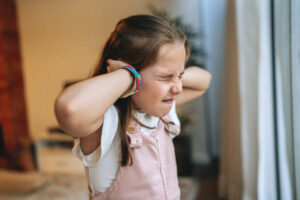New data from Childline reveals that nearly 3,000 children contacted them to seek help for anger issues last year, representing a 6% increase from the previous year.
 The NSPCC says this rise reflects the “growing emotional challenges” young people face in society today.
The NSPCC says this rise reflects the “growing emotional challenges” young people face in society today.
The national children’s charity, which operates Childline, is speaking out during Mental Health Awareness Week to encourage children to process their anger in healthy ways and contact the confidential helpline if they need someone to talk to.
Anger issues a top mental health concern for children
 Between 1st April 2024 and 31st March 2025, Childline delivered a total of 2,895 counselling sessions to children and young people struggling with anger issues.
Between 1st April 2024 and 31st March 2025, Childline delivered a total of 2,895 counselling sessions to children and young people struggling with anger issues.
The NSPCC says this makes anger issues one of the top ten mental health concerns for all genders, and suggests young people are finding it increasingly difficult to manage and control their emotions when faced with pressures at home, school, in the online world and in the community.
The helpline says they have identified several recurring themes from their counselling sessions related to anger. These include:
- Some children struggle to regulate their emotions during challenging situations
- Children often experience frustration with parents and peers following disagreements
- Some children say that they are aggressively criticising themselves
Childline Director Shaun Friel said:
“The fact that children are reaching out for help about their anger issues reflects the growing emotional challenges young people face in today’s complex world.
“At Childline, we’re seeing firsthand how pressures at home, school, online and in communities are affecting children’s ability to manage and deal with difficult emotions.
“This Mental Health Awareness Week, we want to emphasise how crucial it is for children to learn healthy ways to process and express their feelings. We are also reminding young people that our counsellors are here to provide that safe space and can help them to learn vital skills for their wellbeing.”
Advice to help manage anger issues
 Childline has joined forces with children’s mental health charity Place2Be to provide tailored advice for young people and their parents about how to manage anger issues healthily and boost wellbeing.
Childline has joined forces with children’s mental health charity Place2Be to provide tailored advice for young people and their parents about how to manage anger issues healthily and boost wellbeing.
They say this helps to build resilience and establish “positive coping mechanisms” for later in life.
Tips to help children manage their anger include:
- Talk to someone you trust, like a parent, teacher, friend or Childline
- Try to find healthy outlets for difficult emotions, such as physical activity, creative expression, journaling or relaxation techniques
- Take care of your body through regular sleep, healthy food and exercise
- Practice mindfulness by focusing on your breathing and how you’re feeling
- Create a feel-good toolkit with activities, people and places that can help you feel calm and happy when you’re struggling with anger
Tips for parents helping a child with anger include:
- Create regular check-in times for conversations about feelings. This could be during dinnertimes, car rides or at bedtime
- Use open-ended questions rather than ones which can be answered with a ‘yes’ or ‘no’
- Model healthy emotional expression, showing children how you manage your emotions constructively
- Look out for any changes in behaviour, including sleep patterns, appetite, social withdrawal or increased irritability
- Normalise seeking help by speaking positively about therapy, counselling and support services
Place2Be’s Clinical Director, Dr Rebecca Kirkbride, said the charity believes that “learning to express and process emotions healthily during childhood builds resilience and establishes positive coping mechanisms that serve young people throughout their lives.”
She added:
“The rise in children seeking support for issues related to anger, as highlighted by Childline’s data, demonstrates the importance of early intervention and teaching children healthy ways to process emotions.
“By creating safe spaces where young people feel heard and validated, we can help them develop the emotional vocabulary and self-regulation skills needed to navigate complex feelings, without expressing feelings through angry or aggressive behaviour – which may have implications for themselves or others around them.”
Supporting children’s mental health
 First Response Training (FRT) is a leading national training provider delivering courses in subjects such as health and safety, first aid, fire safety, manual handling, food safety, mental health, health and social care, safeguarding and more.
First Response Training (FRT) is a leading national training provider delivering courses in subjects such as health and safety, first aid, fire safety, manual handling, food safety, mental health, health and social care, safeguarding and more.
They work with a large number of early years and childcare providers, as well as schools, colleges, and children’s services.
Their mental health training courses include Understanding Mental Health, Youth Mental Health First Aid, Anxiety Awareness, Self-Harm Awareness and Suicide Awareness.
A trainer from FRT says:
“Children and young people face a myriad of challenges, from exam pressures at school to bullying and other harms in the online world as well as family difficulties and fallout from the cost of living crisis. This can mean they experience lots of tricky emotions and have difficulty processing these.
“It remains hugely important that anyone who works closely with children and young people has an understanding of mental health, is able to spot the signs that someone may be struggling and can offer appropriate early help and support. Focused training can help with this.”
A brief summary of our mental health training can now be downloaded as an infographic.
You can also download our free Guide to Mental Health Training from our website.
For more information on the training that FRT can provide, please call them today on freephone 0800 310 2300 or send an e-mail to info@firstresponsetraining.com.
Support for mental health and wellbeing:
